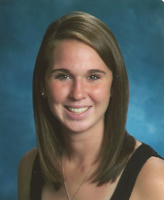
Senior Nicole Shea’s love for psychology began in a pool.
“In high school, I worked with children with disabilities by teaching them swim lessons,” Shea says, adding that her desire to find ways to help such children only intensified during her first psychology courses at the University of Notre Dame. “I was just drawn to it.”
Shea started working in the Department of Psychology’s labs even before she declared her major, and she has already contributed to a published paper and conference poster.
She is also one of the first undergraduates named lead therapist in a Social Robot Intervention study in Assistant Professor Joshua Diehl’s Laboratory for Understanding Neurodevelopment (F.U.N. Lab).
Research Motivations
As part of that study, she spent eight weeks this summer working one-on-one with four children with autism to help them develop their communication skills.
“It was a great experience,” she says. “I was surprised how involved I got to be in it but definitely learned a lot through the process.”
Currently, Shea is preparing a senior thesis with the help of Diehl. “I’ve been immersed in research through my time at Notre Dame and thought it would be a good experience to do something on my own,” she says.
Her thesis focuses on the role of parental autonomy in the lives of autistic children.
“Autonomy is basically your sense of control in decision making,” she says. “I want to see how children perceive their parents and teachers—whether or not their parents and teachers allow them to make their own decisions and do things on their own, and how that plays out in their lives.”
Shea says she hopes to help fill what she perceives as a gap in autism research with respect to this area, a goal Diehl believes is within reach.
“For years, therapy for individuals with ASD [autism spectrum disorders] has focused on how to shape their behavior through external motivation,” he says. “Nicole, however, has identified the importance of promoting autonomy, and by extension intrinsic motivation, as a factor that will truly lead to sustainable change in the lives of individuals with ASD.
“For this she will collect her own data and not rely on my data at all,” he says, “and I have no doubt that this will lead to more presentations and papers for Nicole.”
Professional Aspirations
Shea says her undergraduate work has inspired her to pursue an advanced degree in psychology and then work in a clinical or research setting with children who have disabilities.
“I think the opportunities I have had to get involved with research … have been really outstanding,” she says. “I have gained a wealth of experience here at Notre Dame.”
With her experience and dedication, Diehl says Shea can make a real contribution to the psychology community. “She is committed to science but keenly aware of the clinical applications of her work,” he says. “She has always been driven to create novel scientific contributions that aren’t just intellectually interesting, but have a meaningful impact on individuals with disabilities and their families.
“She is intelligent, thoughtful, and truly an exemplar of the mission of the department and the University.”


